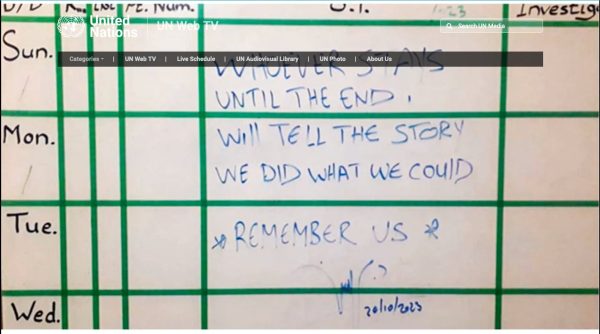
Photograph by Nathaniel St. Clair
There is something of a loose, informal social contract inherent to a successful human society, and that is the condition of reciprocal empathy. When one experiences misfortune, others in a healthy society care and assist, despite there being no contractual obligation. Others care when catastrophe falls upon their neighbors. It’s basic empathy, not a complicated interaction. Yet we have been immersed in a society that simply wants us to feel empathy in one direction, and that is towards those who have ample resources and power but, for whatever reason, have hit a bump in their golden paved road. The empathy our power structures want us to feel is not the kind that extends downward; the narrative is that we should only feel a concern for the already powerful when they face misfortune.
An example of this would be the recent magnification of the loss of housing for individuals like actor James Woods (well, I say “actor” but who knew he was playing himself in Casino?). He has been appearing on all the major “news”–(again, the quotes) channels, weeping and wailing over the loss of his mansion. I ask you this—have any of you ever seen an interview on such media from the homeless who have had every single one of their possessions taken, not by wildfire, but by police sweeps—sweeps often conducted to remove the unsightliness of poverty prior to big game events and concerts and such? I’m guessing no. They wouldn’t even want the homeless in their studio. But of these groups –who is more likely to be able to build back their possessions? I am guessing James Woods is not sleeping below an overpass without a sleeping bag or tent at this time.
The lack of empathy is, of course, what brings people to these dire straits in the first place. As I often say, it’s a feature, not a bug, in late-day capitalism that instead of the carrot dangling like it did in the 50’s (a home, a boat maybe, money to send the kids to college), we are firmly in stick territory. If you do not participate successfully in this parasitic economy, you may end up without any safety net at all in your life. Never mind that we have ample resources to deal with any and all of these problems (for example, Elon Musk’s net worth is 416 billion and the estimated current cost of the LA wildfires from an Accuweather calculation is at 135-150 billion). Can you wrap your head around that? One man, a weird man, has enough money to take care of this problem and still have a majority of his wealth left over. How can things not be completely wrecked in such a scenario? Yet said man spends so much time demonizing those who have nothing to their names by saying things like “in most cases, the word ‘homeless’ is a lie, it’s usually a propaganda word for violent drug addicts with severe mental illness”. Now, that quote I would use maybe for James Woods now that he is mansion-less, but all those other souls out there that Musk was referring to—not so much. Again, can you imagine having all that wealth and power and you use it……to denigrate people so down on their luck that they don’t even have a roof over their heads or a way to get one? It’s a massive tell that Musk has some sort of internal rot in need of healing. He seems to want love so badly, to the point that it is painful to witness, but avoids all the obvious ways that it could truly come his way (mainly extending out kindness and empathy, not being a part of the overall problem that makes worldwide misery index soar). Of course, it’s not ideal to rely on billionaire largesse, but he truly could have more love than he would know what to do with and could try to fill that internal void if he made any attempt at just being kind. It’s as simple as that.
Look at MacKenzie Scott—she is genuinely cared about by an enormous number of appreciative individuals. It’s not normal to amass that much wealth, but the real evidence of decency is what you do with that wealth if it finds you. Musk chooses to shit-tweet about the homeless; Scott is handing out no-strings-attached grants to make the world better. This is speaking to individual-level behavior, of course. The answer is not to have a society that allows for such disparity, but her behavior is a path of attempted decency, his—not so much.
It’s in this setting that it has become completely acceptable that the concern is for the oppressors of the world, but almost never for the oppressed. The situation in Palestine exemplifies that. You can have people fighting to stay alive and to keep their land and it is labeled terrorism. They get no sympathy, but those colonizing and taking it—well, they get all the sympathy should they have that push-back. Americans with the comfort of time seem to understand Little Big Horn, but in the current era can’t see similarities where they exist, mainly because of the spoon-fed narratives of the media—even in the setting of real-time documentation. Up becomes down, sideways becomes straight, so many words lose their meaning. The disproportionate (by that I mean genocide) response is considered normal, but the act of fighting the powers that be is not. It’s never considered to look back at root causes and to rectify inhumane living conditions—it’s just accepted that the powerless are to die off and the powerful need to continue enriching themselves.
It’s like the homeless having their possessions taken along with their make-shift shelters…..instead of seeking humane answers, we criminalize homelessness. We ensure that housing markets are unaffordable by allowing entities like Blackrock to buy up massive amounts of real estate. We limit the possibilities available to claw out of terrible situations and then bemoan the fact that said individuals become unable to participate in what we consider normal society.
Yet, with all of this going on, we allow James Woods and Mel Gibson to whine on television. Ghouls like Laura Ingraham, whose own brother disavows her lack of empathy, amplify their stories. The empathy is to flow upward, never down, much in contrast to the Jesus fellow they all seem to love to align themselves with.
Unless industrialized late-stage capitalism has factories producing needles with camel-sized passage possible, they are screwed if any of that dogma is true.
But I’m not here to Christian-shame—I think we know (and even they know) that they use the label as a shield. Also, I don’t believe in the supernatural of it–that book of theirs is at odds with itself. But I do think that we aren’t here to continue to punch down and use our empathy for those least in need of it, those who definitely exhibit no reciprocity. I’m not going to be shaming those who would make jokes if it makes them feel better to say, “Well, James Woods, maybe you did need a ceasefire.”–do what heals you; he’s going to be fine.
I do think of something I heard once from (okay, keep with me—I’m not going completely woo on you, but I do like to listen to accounts from those who have had near-death experiences; it fascinates me). But anyway, one of those accounts came from a man who came back and said he was told “it’s not a courtroom, it’s a classroom” in regard to his questions about following religious dogma. His entire worldview was changed and opened up post “death” to levels of love and understanding beyond the standard guidelines of individual religions. So let us look at that statement, and for me, for some reason it resonates like no other. In that one sentence, it offers more than atheistic materialism or the rule-based religions of the world. If this is a classroom, what are we learning—how are we trying to do better? Look at a MacKenzie Scott and an Elon Musk for two different paths to take.
There is one thing that I am sure of and that is the fact that we need to normalize the empathy we are capable of and the actions that can stem from actually caring about others. For far too long we have normalized vapid self-infatuation and we hold individuals like Musk up as an example of success, not a cautionary tale. Those with wealth need to come down and join the rest of us in decent human society. You can’t continue to use your damaged soul as the springboard for the philosophies you choose to embrace. It’s as if some use it as the starting point. Gee, I’m rich, healthy, and good-looking (or at least with the money, I was able to make myself look good)……where can I shop around and find something that allows me to continue feeling awesome about that with absolutely no responsibility to others? I know, maybe Ayn Rand or similar rubbish. This is not the way. This is not learning in the classroom of life– this is being the bully, the asshole with no hint of self-awareness. And I’m fairly certain that is not why we are here.






